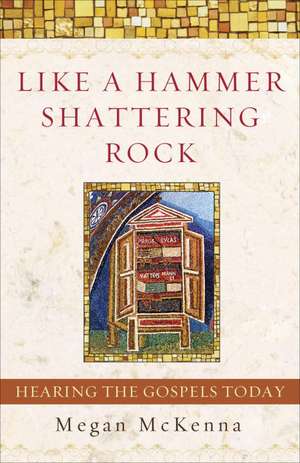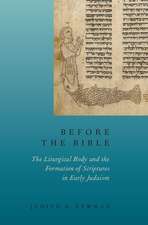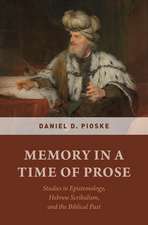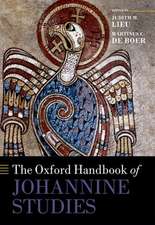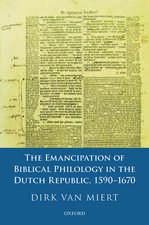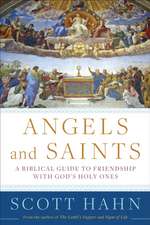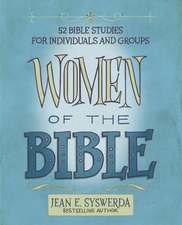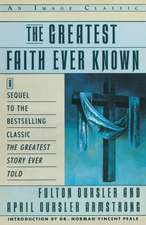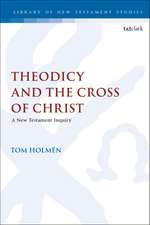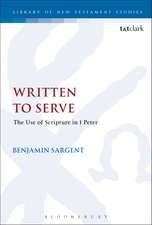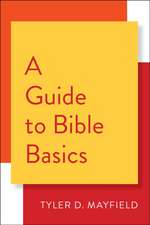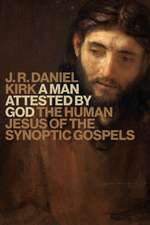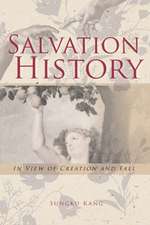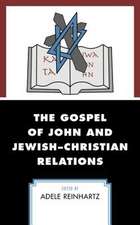Like a Hammer Shattering Rock: Hearing the Gospels Today
Autor Megan McKennaen Limba Engleză Paperback – 4 feb 2013
In many ways, modern audiences have become so familiar with the gospels that we've stopped listening and integreting their wisdom into our everyday lives. Acclaimed author Megan McKenna explores the messages of the four gospels in the context of daily life when they were originally written and interprets their meaning for our modern world. While some argue for the development of new gospels for the 21st century, McKenna argues that we haven't paid due attention to the ones we already have; in many cases, we've ignored sections of these teachings entirely and twisted their meaning to suit our own agendas. McKenna breaks it down, gospel by gospel, and shows us how the lessons of Jesus's apostles continue to resonate.
Preț: 96.93 lei
Nou
Puncte Express: 145
Preț estimativ în valută:
18.56€ • 19.09$ • 15.64£
18.56€ • 19.09$ • 15.64£
Carte tipărită la comandă
Livrare economică 28 februarie-14 martie
Preluare comenzi: 021 569.72.76
Specificații
ISBN-13: 9780385508544
ISBN-10: 0385508549
Pagini: 274
Dimensiuni: 134 x 208 x 20 mm
Greutate: 0.24 kg
Editura: IMAGE
ISBN-10: 0385508549
Pagini: 274
Dimensiuni: 134 x 208 x 20 mm
Greutate: 0.24 kg
Editura: IMAGE
Notă biografică
MEGAN MCKENNA, a native of New York City, has lived in, visited, and gypsied through North and South America, Europe, the Philippines, Singapore, Haiti, the Hawaiian Islands, Malaysia, India, the Marshall Islands, Thailand, Australia, China, and a collection of Celtic and Japanese islands. She works with indigenous groups in base Christian communities and with justice and peace groups, as well as with parishes, dioceses, and religious communities. An internationally known author, theologian, storyteller, and lecturer, McKenna teaches at several colleges and universities and organizes retreats, workshops and parish missions. She has authored more than forty books, including And Morning Came: Scriptures of the Resurrection, Praying the Rosary, Send My Roots Rain, The New Stations of the Cross, and Harm Not the Earth.
Extras
Chapter 1
The Gospel
The Word of God Made Flesh Dwelling Among Us
A word is dead
When it is said
Some say.
I say it just
Begins to live
That day.
Emily Dickinson
For Christians there are traditionally four gospels:
Mark, Matthew, Luke, and John (in the order they were written down). These are the canonical gospels-the four accepted as universally comprising the core of belief within the Church. In reality, historically there were many more-some say nineteen or twenty, others as many as thirty-four. Others say that many communities wrote their own gospels, perhaps as many as two hundred in the first couple of hundred years of Christianity being preached to all the ends of the earth. In Luke's gospel we read in the very fi rst line:
Since many have undertaken to set down an orderly account of the events that have been fulfilled among us, just as they were handed on to us by those who from the beginning were eyewitnesses and servants of the word, I too decided, after investigating everything carefully from the very first, to write an orderly account for you, most excellent Theophilus, so that you may know the truth concerning the things about which you have been instructed. (Lk 1:1-4)
Out of the sheer abundance and diversity of the gospel-orderly accounts of events that have been fulfilled and passed on to others, concerning the truth-these four eventually became the foundation and universally preserved tradition that has been handed on by the institutional Church over the last two thousand years. A gospel is simply "good news," from the Greek euangelion. There were earlier oral traditions and lost written ones besides these four accounts, and there were myriad others. There are many called "lost gospels" and fragments and variations that belong to the category of noncanonical-meaning not usually accepted or included in the core teachings and beliefs of the Church. By the end of the second century these four gospels were chosen and used over the others. It is generally believed that no one really knows exactly how the four were singled out or how the canon was selected. The process seems to have happened at the grass roots, and spread across the Christian world along with the Church, drawing others into the practice and belief of Christianity. In other words, one could say that it was the work of the Spirit. There is mention of the list in 367 by Bishop Athanasius of Alexandria and in The Ecclesiastical History by Eusebius (early fourth century). It is thought that in 325 at the fi rst Council of Nicaea, Constantine established the canon and put an end to the writing of more gospels.
The gospels are collections of Jesus's sayings, stories about Jesus, stories Jesus told, and reactions to these events and words. The practice of writing a gospel is not unique to Christianity; in fact, during the time of Jesus and the early Church, the most common gospel was that of Rome-the good news of the empire and of the emperor who saw himself as and decreed that he was indeed a god. This gospel of Rome was sent out periodically through the entire realm to inform the populace, those conquered, and those who wielded power in its name what Rome was doing and to stir up enthusiasm for the emperor and his edicts and decisions.
None of the four gospels are meant to be read as eyewitness accounts-they are belief statements of the early Christian Church. These are believers' creeds, so to speak: catechetical teaching texts to both prepare people for initiation-the receiving of the sacraments of baptism, confirmation (sealing in the Spirit), and Eucharist-as well as further lifelong instructions and exhortations to believers after the initiation rites, called the mystogia, or the ever-deeper entrance into and experience of the mysteries of revelation and belief.
Generally speaking, the gospels were written within the fi rst hundred years after the death and resurrection of Jesus. This book is not interested in the historicity of the gospels, or specifi cs on their relation to other gospels. The diversity and the depth of the four we have as a foundation are rich and powerful wisdom for anyone who calls himself a believer in Jesus, to be counted among his followers and alive in the community of the Risen Lord. This book is interested in the Truth of the gospels and what they meant and should-and could-mean to believers today. In the last two thousand-plus years, it appears that the Church no longer preaches the gospels of Mark, Matthew, Luke, and John but instead preaches its own gospel: what it has developed into historically and culturally, even politically and economically, rather than the Good News to the Poor, the Good News of the present reality of the Kingdom of God in our midst, and the Good News of Love as I Have Loved You as its essence, meaning, practice, and reason for existence in the world.
This book hopes to look at issues including: If the gospels were written today-Mark, Matthew, Luke, and John-would they say the same things, emphasize the same teachings, the same exhortations on how to live and be in relation with others and the world, and with God? Or is there need for a new gospel? What is gospel truth? How do you read the gospels? What is the connection between Word and practice in the gospels and in the community? How do you take words off the paper, put them into your mouth, and make them live again in a community? If the gospels were originally an oral tradition, how do we reclaim and recover that tradition-read between, under, and over the lines on the pages today? And perhaps most important of all-how does the Word in the gospels in the power of the Spirit continue to convert as radically as it did in its beginning century; to transform human beings' lives, attitudes, decision making, choices, and beliefs on how to be human and like God in the world today?
Basically I am saying that there isn't a need to rewrite the gospels, because we have already done that in many ways: interpreting them to suit our needs, our power, and our agendas rather than letting the Word transform us. We have not lived the gospels or steeped ourselves in their mysteries, their power, and the presence of the Risen Lord among us. We have used the gospels to proof-text other statements and laws. We have taken lines and phrases out of context and often misused them and, in doing so, have often contradicted some of the primary and foundational teachings of Jesus. We have ignored whole pieces of the gospel because they are too difficult and too demanding, too convicting of us as not believing and not practicing what we claim in our words. We have betrayed the gospels as individual persons, as communities, as groups, as institutions, and as leaders-even as Church, the Body of Christ.
The next eight chapters will look at each of the gospels in the order we have them, as they were written, in sets-then and now. We will look at their cores, at their hearts, and at what Jesus is saying, demanding, confronting us with, and summoning us to live. Each chapter will look at the gospel then and will be followed by a look at that gospel today. Each was written for a particular community coping with history, with persecution and peace, with economics and other religions, with governments and cultures, and even with languages. Each has moral principles, values, and commands that are simple, clearly stated, and come with the expectation that they are to be obeyed-along with what to do when they are ignored, disobeyed, and twisted to destroy the integrity of Jesus's words and actions. They were written for believers-some already baptized, others preparing for the sacraments of initiation-and for those who were seeking reentry into the community after betraying their belief or committing such actions that tore the community to shreds religiously and spiritually.
Each chapter that looked at a particular gospel then will be followed by a look at that gospel now, in light of history today, at national, universal, and local church levels. We'll analyze the struggles we are confronted with today not only as individuals but primarily as communities of believers who are to become Good News to all, but especially to the poor, the outcast, the fringe, the excluded, the "other" in all societies. Each gospel will reveal a piece of the larger puzzle of values, and ways of life and meaning that are found at the heart of the gospels-beliefs about Jesus and what it means to proclaim and become the words that we speak aloud to others. Hopefully we will experience the gospels as the living, breathing Word of God, the double-edged sword of truth, laying bare and exposing what is evil and yet as living water and the presence of the Spirit of God breathing life into us still.
The last chapter will look at suggestions for other gospels for the twenty-first-century world, and some issues that are alluded to in the four original gospels but now need to be spelled out: the demand that there be no war, no violence; the relationship between science, technology, and religion; interreligious dialogue; the universe, its resources, and state of being in the two thousand years since Jesus; and the understanding of the world, the arts, and their connection to the gospels. Lastly we will look at the structure of the institution and how it contradicts and has become a stumbling block and scandal for many, even those who already believe. We will examine the position and devaluation of women, of sexuality, of marriage, and the Church that is not the hierarchy as the norm either for holiness or for a life lived in community following Jesus as disciples and friends.
For the remainder of this chapter we will look at how to read the gospels-and reclaim the oral tradition that lived in people's mouths and in the communities of believers before the words went down on paper. We will look at a few underlying assumptions- that the gospels are written for believers and are not to be used to "prove" anything, let alone threaten or harm anyone, or allow others to be harmed in the name of the gospel. We will also examine the necessity of reading the gospels in communities of belief, together and out loud, to provide accountability for our words and the intention to put our understanding of those words into practice, as the norm for studying and knowing the Scriptures; in other words, reading the gospels as wisdom for living. Finally, we will look at Jesus as alive today-in the Word Made Flesh dwelling among us- in the gospels and in the communities that seek to incarnate his words, insights, commands, and hope into their own lives and realities in the here and now.
I will try to avoid documents, doctrines, dogmas, and teachings over the historical development of Christianity as a world power, nation, institutional structure, and global economic reality. But I will quote from past believers and contemporary disciples who struggle with putting the commands of Jesus into practice, being prophetic as Jesus was, and being constantly re-converted to and becoming the Good News for and with others.
Perhaps the place to begin in earnest is with a question and a story. How did Christians get so far removed from the teachings of Jesus, ignoring Jesus's Words and actions and altering them to serve their own ways in the world rather than being a visible sign of power, of hope, of "life ever more abundantly for everyone" (John 10:10)? How did the religion of Jesus become an individualistic work for saving one's own soul, of the morbid fear of sin, death, sex, and of being holy without loving the world and all that God created, with the narrow concentration on the me-and-Jesus mentality, alongside the judgmental attitudes of who is saved and who is damned?
And at the same time, how did the followers of Jesus become those who dominated the world, history, the rise of nations, economics, and politics, steeped in blood, war, violence, torture, and the only religion that has value and meaning? It seems that by the third century, the Church was no longer just the Body of Christ, the followers of the Crucified and Risen One, but instead was the religion that had become the torturers, the empire, the force that dominates, manipulates, and demands that all become believers- or else.
This may sound overly damning and simplistic-but for many this is reality, and those who profess to be believers have betrayed Jesus by past and present behaviors, actions, and teachings. They are indeed both sinners and saints-but it seems the public face is more the sinner, more unrepentant and stubborn in resisting the gospels than in making them come true today worldwide.
What is the situation today? There is an old story, traditionally told in Eastern European and Muslim circles. Sometimes it is called the Lodestone, named for the mythical stone that while in one's possession held the wisdom and power of what it means to be human, to be holy, to be in right relation to others, to understand the mysteries of the universe, and to be in communion with God.
Once upon a time a man was obsessed with searching for and seeking knowledge, wisdom, and understanding. He studied with masters and read every book that he could lay his hands on-and this is at a time when books were rare, expensive, and hand copied. One day, he was finishing up a book on philosophy and got to the back cover. As he was closing the book, he noticed that there seemed to be another page in the binding that was loose-once glued but coming undone. Intrigued, he carefully separated the thin tissue of paper from the cover and found words written there.
Painstakingly he deciphered them and copied them down, and when he read them back to himself out loud he couldn't believe what he was hearing. The words spoke thusly: If you are serious in your intent to discover the Lodestone, the stone of truth-you must be diligent but it is not hard to do. Walk along the sea-the Black Sea-daily, without fail, and pick up stones, one at a time. Hold each in your hand briefl y. If it is cold to the touch, throw it back into the waters. But if it is warm, even fi ery, to the touch, as you hold it, grasp it fi rmly and hold it dear. It will lead you to all goodness and knowledge, to truth and life. Do not be afraid. I assure you, you will have it in your hand before long. Be blessed along the way.
Immediately the man set out for the Black Sea, gave away most of what he owned, left his job, family, friends, and got a small hut near the sea. Early in the morning, for most of the daylight hours and sometimes even in the moonlight, he walked the edge of the shoreline, his feet in the water. He bent and picked up a stone, held it briefly, squeezed it, and then threw it back. He did it for days, weeks, months that led into years. It became a ritual, a dance, a way of living. Pick up a stone (he rarely even looked at them anymore), grasp it firmly, and turn and lob it back into the waters. The stones were invariably cold, even frigid to the touch-never was there one that was hot, even warm. He persevered and was faithful, never doubting even when he was cold and tired that he would one day find that stone that would change him and everything in his life. He mused, wondered, questioned his previous life, thought of the future and what he would do when he had the stone and returned to his other life. He daydreamed and night-dreamed and imagined, hoped, and kept on.
And then one day-it was a bright, beautiful, crisp, and clear day in late autumn and the sea was casting light that was almost blinding-he walked along the edge of the waters, bent, picked up a stone, grasped it, and automatically turned to throw it once again back into its vast bed-but it was not cold, it was flaming in his hand! But he had grown accustomed to the pattern and the routine and before it could register in his mind or his heart that it was hot, he had thrown it back into the sea!
No, everything in him cried out, NO! . . . How could I have missed that one after so long? He dove into the waters, scrambling in the frigid waves, dragging his hands and feet along the sandy bottom, hoping that he would find it again.
Hours later, near-frozen, he crawled forth from the sea. It was over-he'd never find it again-years had passed in his fruitless search. And they say: who knows what he did or if he ever went back home? And they ask: how many times have you grasped the Lodestone, the stone of Truth, and mindlessly thrown it back-and are you still searching for the Truth alone?
Sadly the story is far too close to home and the way we routinely seek the Truth: alone and without accountability, wanting it, but unaware of all the Truth that is around us already. That moment of lost awareness, the dislocation from where we are, our present realities, and our moment in time, contributes to our sense of never having the Lodestone, or of grasping the Truth.
This is in manifold ways what many of us have done with the gospels, the Word of God, the Scriptures: we seek understanding of them singularly, read them to ourselves, share them with no one, or use them to get what we want or desire. We may even change or become converted, but on our own terms, in our own ways, and for our own ends. What began as a conversation with the reader and the book, and perhaps another who had read the book previously, becomes not even a monologue but a proscription, a habit, or a routine and mindless thing to do-missing the elements of dialogue with others, the journey, the seeking, the awareness of the present moment and reality, and that somehow the practice itself is meant to reveal and share the Truth with the one who obeys and seeks to be faithful.
The rise of individualism and the cult of knowledge for oneself as the use and justification of power, often divorced from the world around us, devoid of responsibility and accountability, turning us inside ourselves-all has led to this perception of how to read and use the Scriptures. But it has also led to misuse, abuse, and misinterpretation of the gospels, the stories, the words and accounts of Jesus, too. While reading the gospels, we must keep our singular mind open and not let our monkey-mind (as Buddhism calls the mind that strays from the text and the breath) run rampant. The corrective for this is simple-other people. Originally, the gospels were all oral traditions. They lived, huge pieces of each gospel, in people's mouths, proclaimed, repeated, prayed, intoned, chanted, spoken reflectively-all OUT LOUD, with others listening. The others were crucial to their meaning, insight, power, and how to put the lessons of the gospels into practice and in making sure that the one who spoke the words, as well as those who heard them, actually put them into practice. It was mutual accountability, reminding, remembrance, and exhortation to become true-to intimately connect the words and their lives.
The words of the gospel should be learned by the heart-not memorized or obeyed blindly. They were incorporated-embodied and enfleshed in those who spoke them out loud and put into practice alone and with others, discussed, mulled over, studied, struggled with, and taken to heart. The power of THE WORD of GOD in JESUS is in the text and in the community that believes and seeks to make the Word a reality in their flesh and blood and lives. The sound of the Word of God was the beginning of the transformational process of belief, and becoming what was proclaimed in ritual and prayer. It was a lifelong process, adhered to with others, and these others demanded that each and all live up to the meaning of Jesus's Good News. The words, when spoken out loud, never ceased to astonish, amaze, and bring those who listened and those who spoke them up short!
The gospels are, in a sense, nuts to crack, dig out the meat, and then eat-together, each one getting a taste of it, digesting it, and then becoming it. They cracked open the Scriptures, the gospels, and delved down into layer after layer of meaning that was inspired. To believe that the gospels are inspired is to stake one's life on the reality that the power of the Spirit of God and the Word of God in the text hides and reveals all that believers need to know to become holy, truthful, the Body of Christ; to allow the Word to seize hold of our fl esh today so that the Good News is still proclaimed in our gestures, decisions, deeds, practice, and presence together as a community. If one takes hold and takes to heart the meaning of the gospels with others, and begins to put Jesus's words, exhortations, and deeds into practice, then another level will reveal itself: the conversion of Word into flesh, of Word into practice, of Word into change singularly and as a community of believers. This is the process of inspiration becoming transformation, and it is never ending-in depth of perception, behavior, and practice-becoming like the Word Made Flesh among us.
Sometimes you hear a voice through the door calling you, as fish out of Water hear the waves or a hunting falcon hears the drum's come back. This turning toward what you deeply love saves you.
Rumi (translated by Coleman Barks)
I learned by chance-or perhaps by accident or serendipity- while trying to teach others to read and reflect before speaking to one another that you hear meaning drastically differently and more deeply when you read out loud. I told them to put their hands over their ears and hear the words in their own head as they read the text out loud. They heard and listened to their own voice echoing throughout their own body. They began to hear themselves and remember that sound, that sensation, that knowing, and were confronted by the words, the intent, and the understanding of the text in ways you cannot "get" if you read it off the page in your head. Then I spoke the words out loud, looking right at them-and they knew and heard the power of the words coming off the page and echoing through their ears and into their hearts. The words and the sound of them in my mouth caught them off guard and even stunned them. They not only could hear and understand the words I was speaking on many different levels of meaning, they also touched another kind of truth released through a voice, my sharing knowledge and belief with them through eye contact, resonance, and communion. There was more than content or even comfort or affi rmation of what one already knows or thinks-there was wisdom voiced and revealed in breath, in orality, and in words that could be known intimately-the words lived in my mouth and in their ears and in both our hearts and our bodies.
The words became reality, invitation, expectation, command, possibility, warning, comfort, familiar, strange-an echo resonating truth and faith. The words on the page of the gospels, especially if you believe that they are inspired as well as fi nely crafted, are arranged so that speaking them out loud affects breath, pace, rhythm, the phrasing in one's mouth, sound, depth, cadence-it all moves through the speaker's body out into the bodies of those who listen. It echoes in the mind, stirring insight, triggering memories, calling forth emotions, and even, it is said, altering brain-wave patterns. When the words are spoken out loud and repeated over and over again in the presence of others, they become distilled in the mind, easy in the memory, and they begin to have a life of their own-singing and moving-giving one the sense of the words singing through you, moving through your arteries and veins, sinews and muscles. They move inside you and stay there-move in and dwell, making a home within you. Or as Catherine of Siena said: "There the soul dwells-like the fish in the sea and the sea in the fi sh.1
Speaking the gospels aloud by heart allows them to become intimate friends. In some ways they are two sides of the same hand/ reality: some demand (and you can hear it in your stomach and throat and lungs) short breaths, even gasps; some become drawn out, like singing or sighing (note: even the cartoon character Snoopy had seven levels of sighing!); still others become hard breaths that can sometimes be heard along with the words, cadenced, rising, falling, pulsing, steady, returning breath-like waves on the shore, building in power, even terror, fear that is awe inspiring and mesmerizing- until breath and words stop just before they hit you-then the waves recede and stay with you. It all sounds very poetic, and it is-like reciting a poem that has become you and it tells you almost.
In Buddhism, this learning by heart and speaking out loud is very close to what is called "writing on the bones," the process and experience of taking phrases, stanzas, and lines from the sutras, prayers, and koans of the masters, and learning them by heart- from Buddha's mouth to your own-and learning what they are like in your mouth. This is from Jesus's mouth or the mouth of the Spirit and the Word to your mouth, and learning what they sound like in your mouth now. When you have learned a little of this practice of knowing and speaking out loud by heart the words of the gospel texts, it's like the Spirit borrows your voice, your sound, your body, and your soul and the Spirit-the Breath of God-comes through you in a new and startling way. Or as Hildegard von Bingen, a medieval mystic, said: "When the inner and the outer are wedded, revelation occurs." This is the telling of the gospel as manifestation of God's presence, as epiphany-the showing forth of revelation that can almost be seen, sensed, and certainly can be felt and heard singularly and with many others around you.
What happens between the one who utters the words by heart and the ones who listen is communion. And if both believe that the words and the text itself are inspired by the Spirit, and that the Word Made Flesh in Jesus is present when two or three are gathered together, then the community is inspired and inspirited by the presence of the Risen Lord. This communion is as sacred and holy as the communion of Eucharist that is taken into one's body, chewed on, digested, and taken as nourishment. Both forms of the Word of the Lord, in the gospels and in the Eucharist, are meant to be taken inside, shared so that they become a communion of fl esh/ bone/breath/blood and hope that is expressed in obedience (what the word listen actually means) and worship and practice shared as one.
In one sentence it can be said: in the hearing is the meaning. When the gospel is spoken out loud, by heart, in a community that holds one another accountable to actually put the words into practice and enflesh or incarnate them today in those who believe them, many of the problems of understanding Scripture, like literalism (word-for-word meaning without context), fundamentalism (it only means this and this alone), and the use of Scripture as threats on others can be avoided. Interpreting Scripture becomes more solid, more engaging, and more demanding! The Jews believe that there are forty-three different ways of interpreting Scripture: the whole Bible-each book, chapter, verse, sentence, phrase, word, punctuation, even empty spaces on the page! For Christians this mystery is infinite; there is always more to know and understand of the mystery of God's Word in the human flesh of Jesus and the Word of Scripture in the gospels. The image I use is baklava-a good Greek cook knows that this rich dessert has 122 layers (at least) of thin phyllo dough, ground nuts, honey, lard/butter, sometimes a bit of jasmine or mint pressed down tightly and is then cut and served in an inch-by-inch square. That is all one can digest with good strong dark coffee! And the Scriptures, the gospel of Mark, Matthew, Luke, and John are just like that-packed densely with meaning that can often only be heard in the power and breath of the Spirit, in the text, in the community out loud, in those who know pieces of it by heart.
Much of the theology and the interpretation of the gospels in this book comes from speaking out loud and by heart segments of the gospel and sharing that with others-the listeners who have heard and taken them to heart so that they can put them into practice, live them, and enflesh them in their lives together-in communion as the Body of Christ the Church. This method and process, this experience, is life altering, filled with dread, terror, amazement, and promise for understanding and conversion. It is not as easy to get away from the breath and voice of a word of the heart that is heard in communion with others struggling with its meaning, knowing that you will be challenged on putting it into practice, as it is to read it to yourself.
As you read this book, try to learn bits and pieces, phrases, sentences, parables and stories, prayers and commands by heart, and say them out loud to yourself and share them with others, studying them for meaning. A good way to start and persevere is to use the readings from the Lectionary-the Sunday readings worldwide, just the gospel-with a small group of others struggling for meaning and practice. Ask after listening and some silence: What does this mean, and how do I put this into practice in my life today? What does this mean for us as a community, and what are we to be preaching and practicing in public today? How do I make this come true in the world now? How do I come true and take this Word into my flesh so that I-and we-become Good News, a gospel for the world today?
To encourage you in learning the gospels by heart and to return to the gospels of Mark, Matthew, Luke, and John to delve into them more deeply and truly and let the gospels upend your life, here is the old Irish story of Caedmon, who lived around ad 660 and is sometimes considered the first poet, singer, or storyteller of the English language. It is a story that is part true, part historical, part mystical, part mythical (telling truths that cannot be spoken in mere words and concepts-you must use images to convey the meaning).
Once upon a time there was a simple peasant, a shepherd and day laborer. He lived a lonely life, mostly by choice, but also of happenstance. He was mortified to speak out loud-he stuttered terribly and it was nearly impossible to understand his words or know what it was he was trying so desperately to say. He lived in shame and silence, listening to others or stealing away whenever he could to be out in the fields with the birds and the animals, the air and the wind, the vast night and the stars. He loved, though, to listen to the songs and the tales, to others who could speak with such fl uidity and ease, weaving words effortlessly and having others listen to them. Because he lived in a country of music, sound, songs, harps, stirring ballads, heroic deeds, chants of praise and holy words, the sounds were both a delight and a torment to him. At night when the work was done, everyone would gather and talk, and the words would send them to bed and rest. And when there was a celebration like a wedding or a good harvest, when there was a funeral and death, when war threatened, when there was uneasiness in the land-there was more reason to gather, and all shared in the merriment or grieving, or waiting for what would be.
He would be teased sometimes-cajoled and pushed to speak, to give his ideas or feelings, to sing the praises or to pray, but he just couldn't. He whispered and muttered so that no one knew what he was saying, and as soon as he could he escaped from others. He loved the animals, but best of all he loved the night air: the stars and the dome of sky above him-and the sounds of night, from the trees and their limbs, the sheep and lambs, footsteps, the wings of birds that breathed all around him, sighing and sloughing and speaking their own languages. And it is said that one night an angel came to him and commanded him to speak, to stand alone in the field and raise his voice to the heavens and let all the creatures of earth and sky hear him-to praise the Holy One. He stood and trembled and nothing came out, but the angel was insistent: speak your own words, another's words, the words of psalm or song, any sounds, begin by humming, but lift your voice. He tried-such strange and unfamiliar sounds issued forth from his mouth. His tongue slurred, his throat constricted, his lungs were dry, his mind wouldn't put words in his mouth.
He stood silent before the angel. He was miserable but the angel demanded again-speak out loud. Finally what came forth was a question: "What shall I say? What shall I speak?" And the angel replied: "Speak! Sing! Tell the story! Breathe out, breathe in, let the Spirit borrow you and come through you! And speak of all things, as it was in the beginning!" And he did!
From that night forth Caedmon spoke out loud. He said it just didn't come-he had to work at it-at breathing and throwing his voice, at pulling it up from his abdomen, and casting it forth like bread on the waters. He had to reflect and make sure it was what the Spirit wished to say. He had to make sure the words were clear, understood, taken to heart-he had to put his heart and soul and all his body into the speaking. That fi rst night only the stars, the animals and the field, and his own ears heard his voice (and the angels!) but now it was other human beings, and all that he spoke must be good, must be holy, must draw others to truth and to God's ways and to open the door to God's kingdom. He was only to praise God and all the goodness God made, and call that forth in others, call them back, call them home, in whispers and chants, songs and stories, parables and questions, and with the words of the Scriptures-the gospels-Jesus's own words in his mouth!
Word spread and people from all the local villages and towns came to hear his voice and words . . . word came to the local abbess of the monastery and she sent word for him to come-to come and speak, to preach and teach and say the holy words of the gospels out loud, and he did. His memory grew stronger and he would listen to those who could read and learn all the words he heard by heart, cherishing them and holding them dear. In his voice, people could hear meaning, hope, consolation, freedom, passion, grace, the need for conversion, reconciliation, restitution, justice, mercy, and especially no harm to anyone or anything, no violence, no war- his words, the words of Jesus were of peace and truth. His words were like water, like balm and dew, like thunder and lightning, like music, and sometimes often they led straight into silence, deep and abiding.
And always he reminded people that he was a stutterer, without grace, and that it was God's command that he speak out loud. It was God that opened his mouth and loosed his tongue and kissed his lips that night and that all creation and the angels and God had heard his vow-to speak only the Truth, the peace, and Good News of the Word of God until he spoke no more. And Caedmon did.
Recenzii
"Yes the gospels are truly a good news. Jesus today and yesterday is calling his disciples to love and to act in love. Megan McKenna's excellent book is a source of hope. She calls the disciples of Jesus to be a good news to the poor and the rejected."
-Jean Vanier, founder of L'Arche, an international federation of group homes for people with developmental disabilities
-Jean Vanier, founder of L'Arche, an international federation of group homes for people with developmental disabilities
